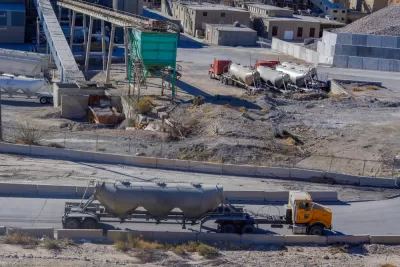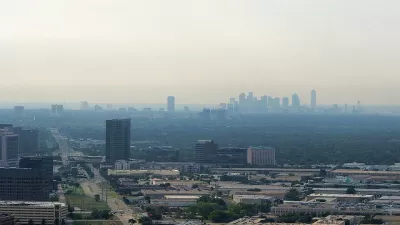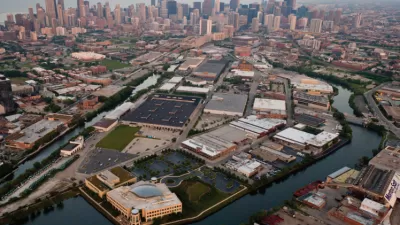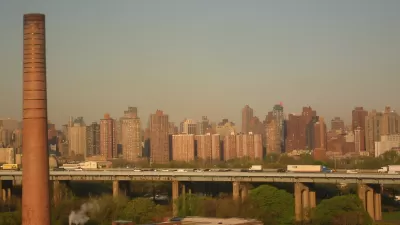Zoning in the U.S. was originally intended to keep noxious uses out of residential areas. Around Houston, which famously lacks a traditional zoning system, polluting uses are still granted broad permission to operate in residential areas.

Allyn West reports on the environmental problems created by concrete batch plants, and the residential neighborhoods dealing with the consequences.
The scene for this environmental justice drama is Harris County, Texas, where the Texas Commission on Environmental Quality (TCEQ) has granted 188 concrete plants the permits to operate, mostly in unincorporated parts of the county like Aldine, where eight concrete plants are currently operating. In Aldine, at least, local residents have scored a pair of recent victories to keep new concrete plants out.
"Though they produce one of the ubiquitous materials of cities, the concrete we pour for everything from sidewalks to stormwater pipes to skyscrapers, the unique combination of Houston’s lack of zoning, the region’s relentless outward growth and an overly permissive state environmental agency means that too many concrete batch plants are making it too hard to breathe," according to West.
This environmental justice issue has roots in the racist land use controls of the past, according to West. "Because land has been cheapened by redlining, disinvestment, restrictive covenants and environmental racism, polluters concentrate unevenly across the region, often intentionally in communities of color and low wealth, compounding other issues and creating entrenched disparities, almost all of which are being exacerbated by the coronavirus pandemic. Those who are exposed the most to pollution are the least responsible for it."
From the experiences of the community in Aldine, however, a model for resistance to the permissiveness of the TCEQ has emerged.
FULL STORY: ou don't want to live near a concrete batch plant. But TCEQ lets it happen too easily.

Alabama: Trump Terminates Settlements for Black Communities Harmed By Raw Sewage
Trump deemed the landmark civil rights agreement “illegal DEI and environmental justice policy.”

Study: Maui’s Plan to Convert Vacation Rentals to Long-Term Housing Could Cause Nearly $1 Billion Economic Loss
The plan would reduce visitor accommodation by 25% resulting in 1,900 jobs lost.

Planetizen Federal Action Tracker
A weekly monitor of how Trump’s orders and actions are impacting planners and planning in America.

Waymo Gets Permission to Map SF’s Market Street
If allowed to operate on the traffic-restricted street, Waymo’s autonomous taxis would have a leg up over ride-hailing competitors — and counter the city’s efforts to grow bike and pedestrian on the thoroughfare.

Parklet Symposium Highlights the Success of Shared Spaces
Parklets got a boost during the Covid-19 pandemic, when the concept was translated to outdoor dining programs that offered restaurants a lifeline during the shutdown.

Federal Homelessness Agency Places Entire Staff on Leave
The U.S. Interagency Council on Homelessness is the only federal agency dedicated to preventing and ending homelessness.
Urban Design for Planners 1: Software Tools
This six-course series explores essential urban design concepts using open source software and equips planners with the tools they need to participate fully in the urban design process.
Planning for Universal Design
Learn the tools for implementing Universal Design in planning regulations.
Caltrans
Smith Gee Studio
Institute for Housing and Urban Development Studies (IHS)
City of Grandview
Harvard GSD Executive Education
Toledo-Lucas County Plan Commissions
Salt Lake City
NYU Wagner Graduate School of Public Service





























